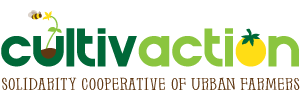

Welcome to Cultivaction
CultivAction operates two farms and five urban gardens. One of our farms is adjacent to the largest forest on Montreal Island, the Morgan Arboretum. Our farms and gardens host vibrant communities of culinary and medicinal plants, both wild and cultivated. CultivAction also has a medium-scale solar dryer in operation.
We are excited to offer the Forest & Field Herbal Program, a three-module, 16-class course designed to engage participants in hands-on learning.
This program is open to individuals of all ages who want to learn how to grow and forage medicinal and culinary herbs on various scales and in different settings. Whether you are looking to embrace a healthier lifestyle, learn how to cultivate, harvest, process, preserve, and package herbs, or expand your existing herbal knowledge, this course will provide both theoretical foundations and practical skills to support your journey towards becoming an herbal expert.
Interactive Learning & Hands-On Practice
Explore the world of herbs through dynamic presentations and practical, hands-on activities. You’ll gain valuable skills in planting, maintaining, and harvesting herbs, as well as kitchen-based preparation and small-scale marketing.
Collaborative Discussions & Knowledge Exchange
Engage in thoughtful discussions where you can share insights, recipes, and experiences with fellow participants, deepening your understanding of herbal practices.
Practical Application & Home-Based Projects
Apply sustainable herbal production techniques in your own space with guided home projects. Track your progress, refine your methods, and receive feedback to enhance your learning experience.
Knowledge Check-Ins
Reinforce key concepts with short, engaging quizzes designed to solidify your understanding—no stress, just a great way to track your growth.
Final Project: Designing Your Own Herbal Garden
Over the course, you’ll develop a personalized herbal garden plan tailored to your space and goals. You’ll implement your plan, share insights with peers, and receive constructive feedback to ensure success.
The Forest & Field Herbal Course features a four-module, 16-lesson curriculum, integrating hands-on learning at CultivAction’s farms, gardens, and nearby wilderness areas. Participants will also work in CultivAction’s processing facilities, which include a solar dryer, sun oven, freeze dryer, and kitchen.
To ensure a complete farm-to-product experience, participants will use harvesting bags, containers, and tools to collect herbal materials from the field, process them on-site, and take home the final products. Additionally, CultivAction will source specialized herbs from diverse ethnobotanical traditions, which are challenging to grow in Canada, for hands-on preparation and extraction exercises.
Get Early Bird Rates Still if You Bring a Friend!
$875 (until March 24, 2025, or if you bring a friend for both of you)
$925 (after March 24, 2025)
As a fee levy contributor, Concordia University students can take advantage of our special subsidized rate and pay just $250 for registration!
Subsidized spaces are limited—register soon!
12 noon-3:00 p.m.
This Course runs biweekly on Saturdays from 12 noon to 3:00 p.m., May 10 to December 6.

Dr. Mohammed Al-Duais is a biologist, specializing in plant ecology and phytochemistry, with more than 17 years of experience in sustainability agroforestry and nature conservation. He has managed and involved in many projects and programs with agroforestry and food security components directly benefiting less privileged communities and smallholder farmers and their ecosystem, in Canada and the middle east respectively. Dr. Al-Duais has significant expertise in university teaching, project and NGO management, technical reporting and auditing, grant writing, products development, team supervision, and capacity building.
Dr. Al-Duais received his Ph.D. in Biology from Friedrich Schiller University, Germany. He served as an Assistant Professor at Ibb University and as the director of the Foundation for Endangered Wildlife (FEW), both in Yemen and was the Natural Science Specialist in the UNESCO Doha Office. He was a Fulbright fellow at the Bioactive Botanical Research Laboratory of the University of Rhode Island in the USA for one year. He was also reinvited in the summer of 2013 to the Institute of Nutrition, Friedrich Schiller University, where he continued the phytochemical investigation on less-used vegetables from Yemen ethnobotany. Dr. Al-Duais is currently serving as a Research Associate at the McGill Institute for Global Food Security. He is involved in the interdisciplinary research on global food security, with a focus on developing novel methodologies, with a comprehensive ecosystem approach, to tackling the cycle of poverty and malnutrition. Out of his research activities, many concept notes were submitted to partners and he is the CEO and co-founder “Harvest for Health Inc.”, a McGill startup focused on solving the globally increasing hidden hunger and its consequences.
Relevant to Dr. Al-Duais involvement in food security he is a member of the food literacy committee, under Montreal West Island Community Resource Centre, he is also the CEO of Permaculture Sainte Anne de Bellevue (PSADB), which is a nonprofit organization established by the “Moving Towards Sustainability” Fund of Sainte Anne de Bellevue municipality. Under PSADB he managed many agroecology urban projects including Duff-Court Neighborhood Life Committee urban farm and two other urban gardens in Montreal island, Canada.
The farm does not have an address which can make it tricky to find the first time you go there. These instructions will help you find your way.
The directions below are from by Santropol Roulant (a neighbouring farm).
If you’re having a hard time getting to the Senneville farm, please contact Mohammad at 514-443-3263
